Are you finding yourself straining to catch snippets of conversation, or regularly asking others to repeat themselves? Are you having to turn the TV up again? If your existing pair of hearing aids isn’t getting the job done anymore, it might be time to reassess them. Knowing when to upgrade your hearing device can significantly impact your quality of life, yet it's a decision many individuals delay or overlook altogether.
Research from the CDC paints a concerning picture: nearly half of Americans grappling with hearing loss have not seen a doctor for their condition in the past five years. Factor in the recent financial strains, along with the steep costs associated with hearing aids and doctor visits, and it's evident that economic constraints often leave individuals with outdated hearing solutions.
How do you know when it’s time to buy a new hearing aid? Learn about hearing aid longevity, why it’s important to replace your worn-out hearing aid, and how you can do so at an affordable price.
How long do hearing aids last?
The average lifespan for a high-quality hearing aid is three to seven years. This longevity is based on factors that include:
- Patient health: Increasing age or advancing health issues can make it necessary to update your hearing aid.
- Frequency of cleaning: Hearing aids are exposed to sunlight, temperature changes, and natural body processes such as sweat and ear wax production. That’s why it’s necessary to clean your hearing aids daily, and, if necessary, consider scheduling a professional cleaning every six months or so.
- Tech advancements: Technology is always evolving. If you haven’t replaced your hearing aids lately, you may be interested in new advancements in sound processing, customized user settings, and Bluetooth compatibility.
When Is It Time to Purchase a New Hearing Aid?
Whether you're a longtime hearing aid wearer or considering one for the first time, understanding the signs of when it's time for a new device is essential for maintaining optimal hearing health and enhancing your overall well-being.
You find that you just can’t hear as well anymore.
While this is the obvious answer, it’s still the litmus test. Here’s a quick checklist from the CDC study mentioned above:
- Are you frustrated by not being able to understand family and friends?
- Can you follow a conversation when there’s background noise?
- Can you follow a conversation even if you can’t see the person’s face?
- Are you often exposed to loud sounds, either at work or away from work?
Unfortunately, it’s easy to become desensitized to a low-quality hearing aid; so if you’re not sure, ask your relatives or colleagues at work if they’ve noticed any difference in your hearing.
You're having feedback issues.
Endless whistling and high-pitched whines are sometimes a sign of increased ear wax production. However, they can also indicate that it’s time for a new hearing aid.
It’s no longer reliable.
If you’re experiencing a shorter battery life, or your hearing aid is stopping and starting, you may need to replace your hearing aids.
You’re having health and lifestyle changes.
Health changes can greatly impact hearing. Likewise, if you’ve started a new career or embarked on a new regimen of outdoor exercise (such as hiking), you may need to update to a hearing aid with more advanced technology that will meet these demands.
An Affordable Way to Replace Your Hearing Aid
In today’s market, the average price for a single hearing aid from a clinic is around $2,000 (or $4,000 per pair, which is the way most consumers purchase them). These are daunting figures—and that’s why so many people have discovered the benefits of buying OTC hearing aids online.
If you’re ready to replace your hearing aid, the good news is that you can do everything online—from testing your hearing to purchasing hearing aids—at a fraction of the cost. You can start the process with a free online hearing test from MDHearing and have a free consultation with a hearing specialist, who will assess your test results and recommend the best hearing aid for your health needs and lifestyle. Then you can choose from a variety of high-quality, FDA-registered OTC hearing aids for thousands of dollars less than a clinic.
However, when shopping online for hearing aids, be sure to do your research. Retailers like Costco are advertising bargain hearing aids, but these still start at $1,499 a pair. That’s why it’s important to find an online retailer that specializes exclusively in top-notch (but still affordable) hearing aids and accessories.
The MDHearing Solution
Enter MDHearing, an online company that pioneered online hearing aid sales more than a decade ago. Founded by a Chicago ENT doctor who was appalled at the high cost of hearing aids, MDHearing specializes in providing the same state-of-the-art hearing technology offered by brick-and-mortar stores and clinics, but at greatly reduced prices. To date, more than half a million Americans have purchased their hearing aids from MDHearing.
Because we cut out the middleman (and eliminate overhead costs), MDHearing customers can purchase a pair of OTC hearing aids for as little as $297 per pair, saving more than $1,000 over similar Costco models. Likewise, an advanced pair of smart, rechargeable hearing aids—similar to products priced at $4,500 or more—costs only $699.98. In addition, every hearing aid from MDHearing includes a risk-free, 45-day trial, lifetime support from U.S.-based hearing professionals, free shipping, and affordable monthly payment plans.
Investing in a hearing aid is a small price to pay for better life quality and overall well-being—but why pay thousands of dollars more? If you’re ready to improve the quality of your hearing, be sure to contact MDHearing to find out more about our affordable, high-tech hearing aids.
Check your hearing for free with this 5-minute test and see how we can help.
TAKE ONLINE HEARING TEST
